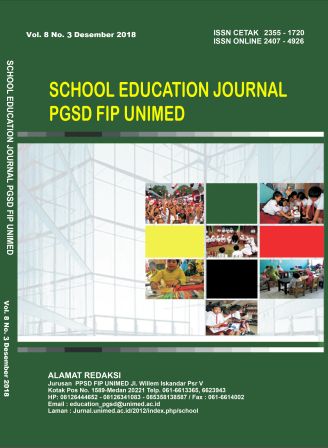MENINGKATKAN HASIL BELAJAR DENGAN MENGGUNAKAN PENERAPAN METODE KOOPERATIF SCRIPT SISWA KELAS IV SD NEGERI 167647 TEBING TINGGI
DOI:
https://doi.org/10.24114/sejpgsd.v8i3.11677Abstract
This study aims to improve student learning outcomes using the application of the cooperative method script fourth grade students of SD Negeri 167647 Tebing Tinggi City. The cooperative script method is one of several methods in the cooperative learning model (Cooperative Learning). This method was proposed by Danserau and friends in 1985. Cooperative learning is a group learning activity to work together to help construct concepts, solve problems or inquiry (Suyatno, 2009: 51). From the results of the learning activities that have been carried out it can be concluded that the application of cooperative script learning methods has a positive impact in increasing students' interest and learning achievement on Indonesian language subjects in Class IV 167677 SD Negeri Tebing Tinggi which is characterized by an increase in student learning completeness in each cycle. The application of the Cooperative Script method makes students more active, accountable for their assignments and delivers news / story ideas about Indonesian language learning material taught by teachers individually or in groups.Keywords: Learning Outcomes, Cooperative Scripts, Indonesian LanguageDownloads
Published
Issue
Section
License
Authors whose manuscripts are approved are approved as follows:
The publication rights for all journal manuscript materials published/published on the SEJ (School Education Journal) E-Journal site are held by the editorial board with the author's knowledge (moral rights remain with the manuscript authors).
The formal legal requirements for accessing this electronic digital journal article are subject to the terms of the Creative Commons Attribution-ShareAlike (CC BY) license, which means that E-Journal SEJ (School Education Journal) has the right to store, transfer media/format, manage in the form of a database, maintain, and publish articles without asking permission from the author as long as the author's name remains as the copyright owner.
Manuscripts published/published electronically are open access for educational, research, and library purposes.

